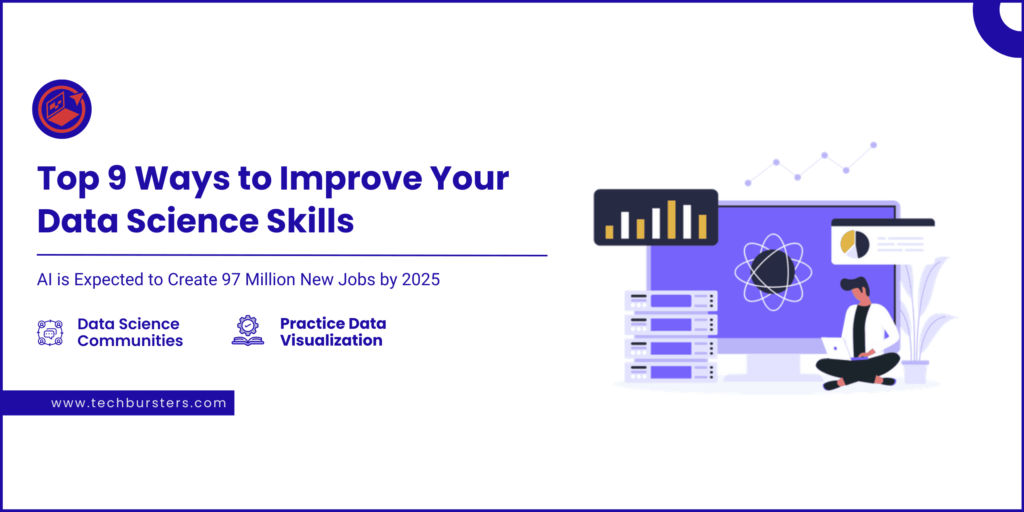
Let’s face it-data science is no longer a buzzword; it’s the career move almost everyone wants. Whether you’re new to the field or looking to sharpen your skills, there is always room for growth. The world of data is continuously evolving, and you must stay ahead of the curve. But you don’t have to overwhelm yourself! We’ll give you some easy ways to improve your skills. So, let’s dive right in!
Top 9 Ways to Improve Your Data Science Skills
Here are 9 easy, practical, and fun ways to take your data science game to the next level:
1. Invest in a Good Data Science Course
First things first: education. Laying a good data science foundation is like laying the foundation of your house. If your basics are shaky, everything you learn later won’t stand strong. Many online platforms like Interview Kickstart offer the best data science course ranging from basic to high levels of training. Whichever one chooses, a well-structured data science course will teach the necessary concepts: Python programming, data visualization, machine learning, and more. Moreover, data science courses often include projects that allow one to try what has been learned in real-world examples.
| Top Platforms for Data Science Courses | Course Features |
| Coursera | Project-based learning, flexible timelines |
| Udemy | Budget-friendly, lifetime access |
| edX | University partnerships, certifications |
2. Practice Coding Daily
Data science is all about coding; it is not just about algorithms and models. Python and R are the lifeline of data science. The more you practice, the stronger your coding will get. LeetCode and HackerRank are sites for practicing code. A good place to start is by dedicating at least 30 minutes daily to solving problems or working on modifying data science interview questions.
In a survey conducted by Stack Overflow in 2023, Python ranked third in the overall global rankings of most used programming languages, where 49.28% of developers regularly use the Python programming language.
3. Contributing to Open-Source Projects
Ever heard the phrase “the best way to learn is by doing”? Well, it goes with data science too! Contributing to open-source projects is one fine way through which you get hands-on experience. Websites like GitHub have plenty of data science projects where you can contribute. Be it code improvements, cleaning up datasets, or even creating visualizations, there is always something to be done. Plus, you get a chance to work with senior data scientists and learn many tips from them.
| Benefits of Contributing to Open Source |
| Collaborate with a global community |
| Improve coding and data manipulation skills |
| Build a strong portfolio for future job interviews |
4. Master Data Science Interview Questions
What’s the best way to improve your skills? Practice as if you were attending a job interview! Have a look at common data science interview questions and start practicing your answers. It forces you to think deeply about the problems you may face in a real-world scenario. Most data scientist interview questions center around the most confusing concepts regarding probability, machine learning algorithms, and data-wrangling techniques.
Here are some sample data science interview questions that might be asked in a data science interview:
- How do you handle missing data in a dataset?
- Explain the difference between supervised and unsupervised learning.
- What’s the role of a confusion matrix?
5. Read Research Papers & Stay Updated
Data science is fast-moving, and hence it is important to keep updated. One sure means of accomplishing this is by reading academic papers and research articles. Websites such as arXiv, Medium, and Towards Data Science will keep them updated with recent developments in machine learning, artificial intelligence, and manipulation techniques in data.
Here’s a cool statistic: AI is expected to create 97 million new jobs by 2025, according to the World Economic Forum. Well, if you want to be part of that tide, then staying up-to-date with the latest research is one thing you can not afford to miss out on.
6. Work on Projects Independently
Personal projects are the secret sauce to becoming a better data scientist. Want to get better at data visualization? Pick some datasets and start visualizing trends. Want to get better at machine learning? Build a predictive model for something that interests you—like stock price prediction or classifying images of pets.
By doing personal projects, you develop your skills and create a work portfolio which is a huge plus in job interviews. Who doesn’t want to present an awesome project when they are asked about their experience during the data science interview?
7. Join Data Science Communities
Learning is a social sport. The best way to improve in data science is to join communities of fellow practitioners with whom you collaborate. Sites like Kaggle, Stack Overflow, and the Data Science community on Reddit are excellent places to ask questions, share knowledge, and jointly solve problems.
Another piece of advice is to attend hackathons! Not exclusively agonizingly competitive, though highly rewarding. You learn to solve real-world problems while honing your coding, wrangling data, and collaborating in teams.
| Popular Data Science Communities | Why Join? |
| Kaggle | Hands-on competitions, datasets |
| Stack Overflow | Coding support, expert advice |
| Reddit’s Data Science Subreddit | Knowledge sharing, mentorship |
8. Sharpen Your Math and Stats Knowledge
Let’s get real: data science is not all about coding and models. There’s a great need to understand mathematics and statistics. You don’t have to be a mathematician, but some fluency in the basics of linear algebra, probability, and statistical analysis will take you far. Many data science interview questions tend to be applications of core statistical concepts. Be comfortable with terms like p-values, hypothesis testing, and matrix multiplication.
9. Practice Data Visualization
Data is great, but what good is the data if you can’t explain it? That’s where the data visualization comes in. Tools such as Tableau, Power BI, and even Python libraries like Matplotlib and Seaborn help you create visualizations to make understanding your data that much simpler. As you practice data visualization, you’ll learn to tell great stories with data, which is a very important skill for any data scientist.
Final Thoughts
Improving your data science skills needn’t be a chore. If one has the right mindset and attitude towards learning, then that will be fun and incredibly rewarding. From taking a data science course down to working on projects personally and solving data science interview questions, there are enough chances to grow along the way to becoming an outstanding data scientist. So why wait? Level up your skills today!
